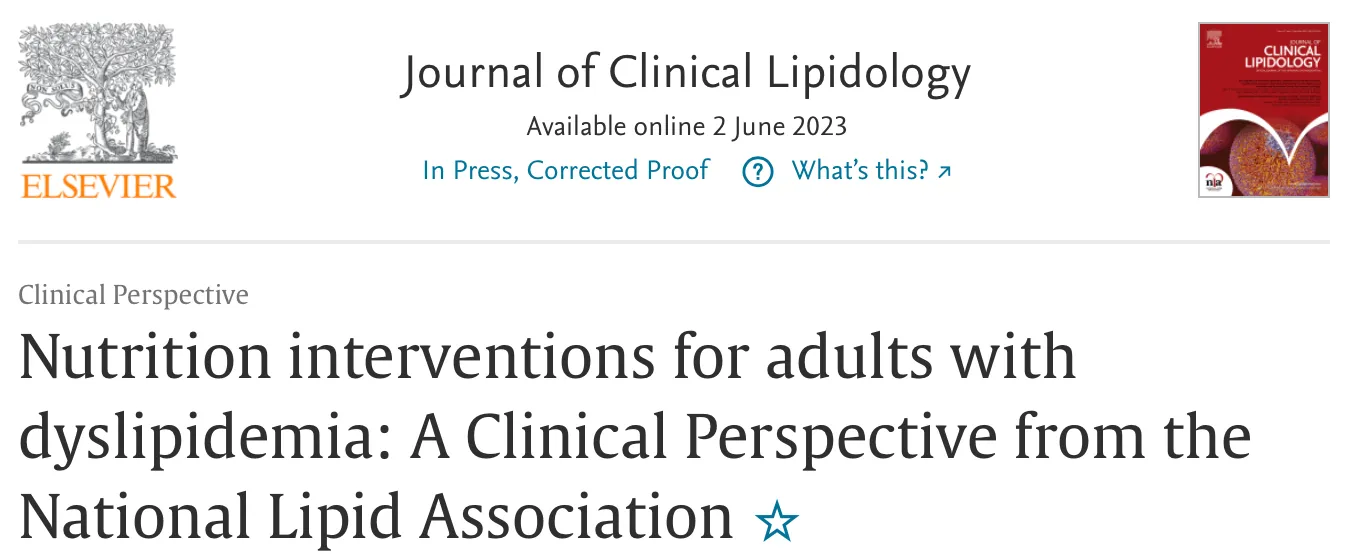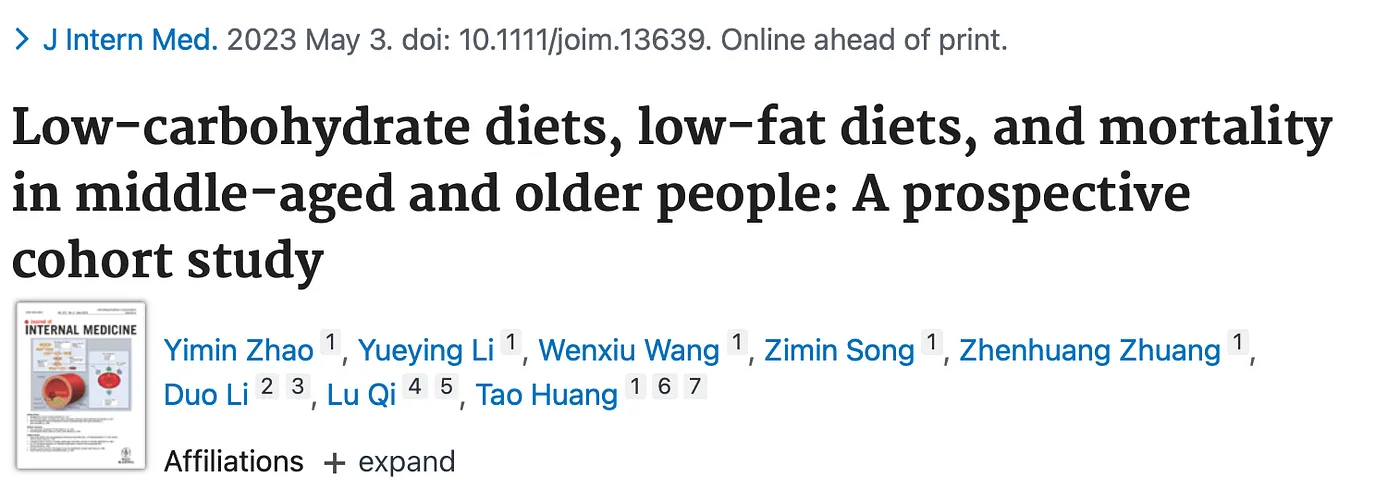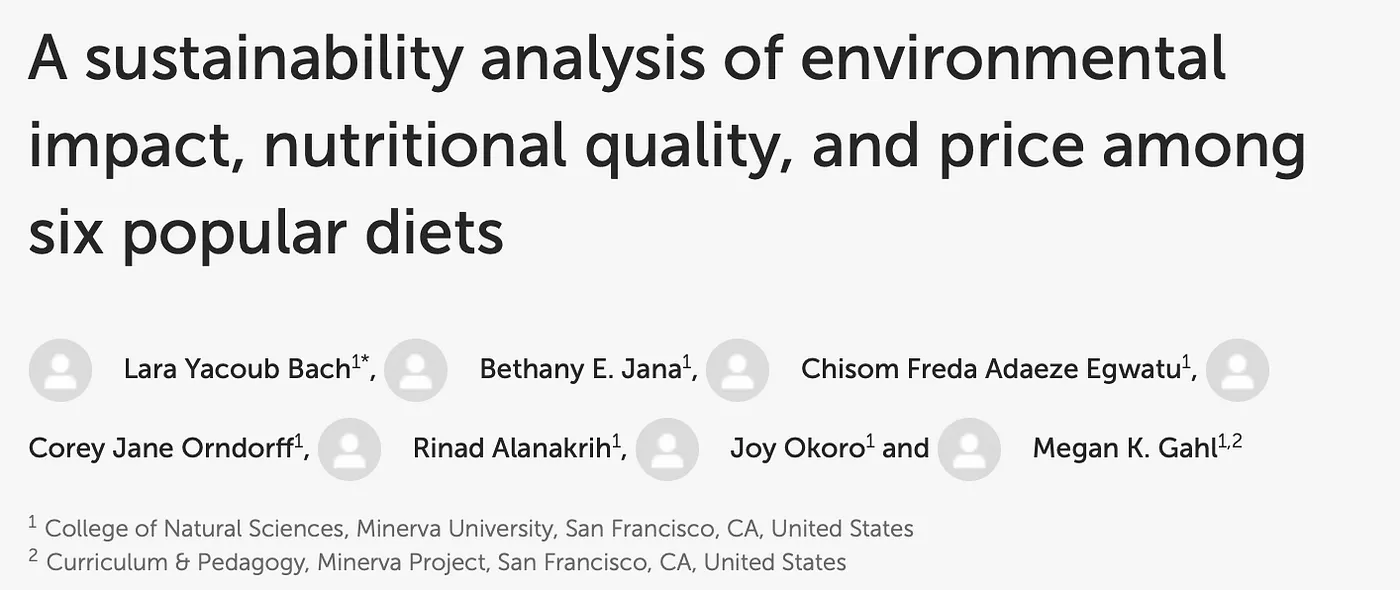Review of the plant-based nutrition news June 2023
This month I highlight studies on plant-based diets and blood lipids, cancer prevention and longevity. In addition, I cover how to do a low-carb diet well, and the impact of diet choices on planetary health.
den=”false”>

PLANT-BASED DIETS ARE BEST FOR HEART HEALTH: There really is nothing new in this study but it is great to have confirmatory evidence from this large meta-analysis of 30 randomised studies following adults for over 18 years showing that vegetarian and vegan diets consistently lead to lower levels of blood total cholesterol, LDL-cholesterol and apolipoprotein B (apoB). These blood lipids are directly implicated in the development of atherosclerosis — fatty plaques in the arteries — that over the long-term cause heart attacks and stroke. In case you are not familiar with apoB, this is a protein found in the LDL-particles that is key to their ability to cause atherosclerosis. ApoB is found in all atherosclerosis-causing lipoproteins, so it is actually a better marker of cardiovascular risk than LDL-cholesterol. However, the standard assessment for cardiovascular risk, certainly in the UK, still relies on LDL-cholesterol levels. The aim is to keep LDL-cholesterol as low as possible over the whole lifespan, as lifetime exposure to elevated levels creates the increase in risk rather than the level at just one point in time. Reducing LDL-cholesterol levels has a HUGE impact on cardiovascular risk. Each 1mmol/L (38.7 mg/dL) reduction in LDL-cholesterol is associated with an average 22% reduction in major vascular event risk and a 10% reduction in all-cause mortality over a 5-year period.
The researchers found that both vegetarian and vegan diets reduced total and LDL-cholesterol to a similar degree, but separate analysis was not conducted for apo-B levels.
Interestingly, vegan and vegetarian diets did not result in lowering of triglyceride levels. This is actually not a surprise and several studies have shown that a Mediterranean-style diet may actually be more effective at lowering TG levels, mainly because of the higher content of unsaturated fatty acids. This is a great video on lowering triglycerides on a plant-based diet.
Main messages are to emphasise unsaturated sources of fat, from olive oils, nuts, seeds and avocado. Avoid refined carbohydrates, replacing them with whole grains, maintain a healthy weight, avoid alcohol and for some people, reducing intake of carbohydrate-rich foods and replacing them with plant foods higher in protein and fats may help.
Overall, meat free diets are a great choice for optimising cardiovascular risk factors, and it is also great to see the authors point out that meat-free diets have co-benefits for planetary health, an aspect of our dietary choice we can no longer ignore. A reminder of the recent practice statement from the American Society for Preventative Cardiology that recommends a variety of plant-predominant diets for prevention of atherosclerotic cardiovascular disease, including Mediterranean, DASH, healthy vegetarian, and exclusively plant-based diets.

NEW GUIDELINES ENDORSE VEGAN DIETS FOR OPTIMISING BLOOD LIPID LEVELS: A vegan diet is highlighted as one of several healthy plant-based diet patterns that should be used to optimise blood lipid levels, both cholesterol and triglycerides. The authors point out that the recommended dietary patterns are also best for reducing the risk of other common conditions such as type 2 diabetes, dementia and certain cancers, supporting healthy ageing and quality of life.
The key recommendations for foods and nutrients to emphasise in the diet can easily be met by adopting a healthy vegan or 100% plant-based diet.
- Replace saturated fat (from animals and tropical oils) with unsaturated fats (from nuts, seeds, healthy oils)
- Emphasise plant sources of protein from beans and nuts
- Prioritise fibre-rich foods, including fruit, vegetables, whole grains and beans
- Include foods high in viscous fibres, such as oats, barley, legumes (e.g., lentils, lima beans, kidney beans), and chia seeds, as well as fruits, including apples, peaches, and pears, and vegetables, including asparagus, Brussels sprouts, and sweet potatoes. Supplements can be considered too.
- Consider supplementing with 2g per day of plant sterols
- If triglycerides are high, consider supplementing with high dose DHA/EPA
Limit or avoid
- Processed meat
- Refined grains and added sugars
- Alcohol
- Foods high in sodium
Other lifestyle recommendations
- Maintaining a healthy weight
- Regular physical activity
- Prioritising sleep
- Managing stress
- Avoiding tobacco
All of these recommendations have an additive effect and overall, a diet and lifestyle approach can lower blood lipid levels by around 30–40%, which can result in as much as a 30% reduction in risk of cardiovascular disease. Pharmaceutical medications may also be needed and beneficial, but these would be in addition to lifestyle changes.
Check out our factsheets which cover topics, including heart disease, cholesterol and triglycerides.

PLANT-BASED DIETS AND DIGESTIVE CANCERS: My favourite plant-based dietary index score! This time to analyse data from the Nurses’ Health Study, Nurses’ Health Study II and the Health Professionals Follow-up Study, which included more than 210,000 participants recruited to these studies in the 1980’s and 1990’s. Dietary data was scored according to the Plant-Based Dietary Index (PDI), differentiating between healthy and (hPDI) unhealthy PBDs (uPDI). Adherence to the PDI was correlated with risk of gastrointestinal/digestive cancers.
The results showed that those participants most adherent to a hPDI had a lower body mass index (BMI), were more physically active, and were less likely to have diabetes. The plant-based diet indices were significantly associated with risk of total digestive system cancer as well as individual organ cancers. For every 10-point increase in both the PDI and hPDI there was a significant reduction in risk of total digestive cancers (6–7%). There was a greater reduction in risk of pancreatic and liver cancer with adherence to the hPDI (17% and 31% respectively). In contrast, the opposite was true for uPDI, which was associate with an increased risk of total and site-specific digestive cancers. These results remained significant after adjusting for BMI and red meat consumption. When considering specific food groups, consumption of whole grains and nuts were particularly associated with a lower risk of cancer, whereas consumption of sugar-sweetened beverages were associated with an increased risk.
These are not particularly surprising findings given what we know about plant-based diets. The high fibre content supports better gut health, including the health of the microbiota. In addition, there a numerous other beneficial antioxidant and anti-inflammatory compounds in plant foods that protect against cancer development. At the same time, diet high in plant foods are lower in cancer-causing animal foods, such as processed red meat. The authors conclude ‘This study highlights that improving quality of plant-based diets may be important for the prevention of overall digestive system cancers.’ Although the study highlighted includes most White participants, the benefits of eating more fibre (from plants) is evident in non-White populations too. For example, this study from Korea clearly demonstrates the benefit of fibre consumption for prevention of gastrointestinal cancers, with benefit seen from consuming a variety of plant foods.
A huge meta-analysis of studies published in 2022, including more than 3 million participants, also showed that plant-based dietary patterns, including vegan and vegetarian, were protective for a variety of cancers of the digestive tract.
With the large amount of knowledge supporting healthy plant-based diets for prevention of cancer, including those related to excess weight, it is very sad to see the results of this recent paper that addressed specifically the issue of access to healthy food in the US. The results showed that living in areas that have a high density of fast-food outlets and convenience stores compared to areas with more grocery stores and farmers markets resulted in an increased risk of obesity and obesity-related cancers.
It is not only the risk of developing cancer that is important to address, but also the risk of living well after a diagnosis of cancer. There is emerging evidence that a plant-based diet may be useful for improving prognosis after a diagnosis of cancer, especially for colo-rectal and breast cancer with once again fibre, whole grains, fruit, vegetables and soya consumption being beneficial.

PLANT-BASED DIETS, CHRONIC CONDITIONS AND RISK OF DEATH: It’s great to see the plant-based dietary index being used to analyse data from a UK cohort. The analysis included 126,394 participants from the UK biobank study recruited between 2006 and 2010 and followed till 2021, providing 10–12 years of follow-up. The mean age was 56 years, and the majority of participants were White. Data were collected on diet, lifestyle and health and dietary intake was scored using the plant-based dietary index — the overall PDI, unhealthy PDI and healthy PDI. Participants with higher hPDI scores compared to lower scores had a 16% reduction in risk of death from all causes, whereas participants with higher uPDI scores had a 23% increased risk of death. Higher hPDI scores were associated with a 7% reduction in cancer risk, 8% reduction in cardiovascular disease, 16% reduction in ischaemic stroke and 14% reduction in heart attacks. In addition, there was a benefit of greater adherence to the hPDI for those at higher genetic risk of cardiovascular disease. In contrast, higher uPDI scores were also associated with a higher risk of cancer (10%) and a higher risk of dying from cancer (19%) and up to a 23% increased risk of cardiovascular disease. There was no association of the hPDI or uPDI with fracture risk or haemorrhagic stroke, which is relevant given results from vegan cohorts that suggest there may be an increased risk. You can read more about bone health and stroke in my previous articles.
The authors of this study conclude, ‘Overall, our results suggest that a healthful plant-based dietary pattern — characterized by lower amounts of animal foods, sugary drinks, snacks and desserts, refined grains, potatoes, and fruit juices — is associated with lower risks of mortality and major chronic diseases’.

HOW TO DO A LOW-CARB DIET WELL: This large study investigated the impact of low-carb and low-fat diets on mortality. The analysis included 371, 159 participants aged 50–71 years from the NIH-AARP (National Institutes of Health–American Association of Retired Persons Diet and Health Study) prospective cohort study who had been followed for a median of 23.5 years. Dietary data were analysed using six difference scores; overall, healthy, and unhealthy low-carb and low-fat diet scores. Of note, the low-carb diet was not very low in carbohydrates with the lowest category being <40% of energy from carbohydrate. The lowest category for fat consumption was <20% of energy.
The researchers found that low-carb diets were associated with a 14% higher risk of death, with unhealthy low-carb diets high in animal fat and protein associated with a 17% increased risk of death. Overall and unhealthy low-carb diets were associated with a 12% and 15% increased risk of cardiovascular death, respectively and a 14% and 17% increased risk of death from heart disease. Overall and unhealthy low-carb diets were also associated with an 18% increased risk of death from cancer. However, if the low-carb diet was low in refined carbohydrates, higher in unsaturated fats and plant protein then there was a small 5% reduction in the risk of overall death.
An overall low-fat diet was associated with a 9% reduction in risk of mortality. Interestingly, even an unhealthy low-fat diet had a small 2% reduction in mortality. If the diet was a healthier version of a low-fat diet, high in healthy carbohydrate-rich foods (whole grains, whole fruits, legumes, and non-starchy vegetables), plant protein and low in saturated fat, there was an 18% reduction in the risk of death, 16% reduction in cardiovascular death and 18% reduction in cancer-related death. In contrast, less healthy low-fat diets which were high in refined carbohydrate and animal sources of protein had a very limited impact of mortality reduction.
Researchers also conducted a substitution analysis, which showed that replacing 3% of calories from saturated fat with any other macronutrient resulted in a lower risk of death. Similarly, replacing refined carbohydrates with plant protein or unsaturated fats resulted in a lower risk of death. The greatest benefit was seen when saturated fat was substituted for plant sources of protein.
The authors conclude ‘Our results suggest that a healthy low-fat diet with minimal saturated fat intake would be an effective dietary strategy for healthy ageing among middle-aged and older people’. This is easily achieved with a plant-exclusive diet. Interestingly the authors point out that despite the perceived inferiority of plant protein composition compared with animal protein (an outdated notion), the participants in this study had superior outcomes when prioritising plant protein even though they were at higher risk of sarcopenia based on their age.
Overall, the study confirms that it doesn’t really matter about the macronutrient combination. Low-carb and low-fat diets can both be healthy if they are composed of health promoting foods i.e. plant sources of fat and protein and high-quality carbohydrate rich foods (fruits, vegetables, whole grains and beans).
I am reminded of another recent paper that performed a meta-analysis of 3 studies of low-carb, ketogenic diet in people of normal weight to establish the effects on blood lipid levels. The results clearly showed that a ketogenic diet let to detrimental increases in total and LDL-cholesterol. Additional research has also highlighted the increased risk of colorectal cancer in individuals consuming an animal-based low-carb diet.

RED MEAT CONSUMPTION IS BEST AVOIDED: In case we needed any more evidence, red meat is best left off the plate. This large systematic review and meta-analysis asked whether the consumption of both unprocessed and processed red meat affected the risk of cardiovascular disease (CVD) and type 2 diabetes and whether geographical location and sex impacted this risk. Forty-three observational studies for CVD and 27 for diabetes were included. This amounted to the inclusion of 4.4 million individuals for CVD and 1.76 million for diabetes from four continents.
Overall, the results showed that for each 100g/day of unprocessed red meat consumed, there was an 11% and 27% increased risk of CVD (this included coronary heart disease, stroke and heart failure) and type 2 diabetes, respectively. For processed meat, each 50g/day consumed resulted in a 26% and 44% elevation in risk of CVD and type 2 diabetes. The associations were similar for male and female sex. The association with stroke and type 2 diabetes specifically was more obvious in Western settings than Eastern.
There are so many known reasons for these findings, which I have summarised extensively before. Red meat consumption is associated with higher blood lipid levels, higher blood pressure, greater risk of overweight and obesity, inflammation, gut dysbiosis and so forth. The more pronounced negative effect in Western populations is likely down to a dose-effect — more meat consumed in general — plus other factors such as higher rates of obesity.
The take home message from the authors, ‘Lowering red consumption is beneficial for the prevention of CVD and diabetes’. I personally cannot think of a single reason to include red meat in the diet, and when you consider the impact of meat production on planetary health, it seems a no-brainer to remove meat, especially red meat, from the diet.

PLANT-BASED DIETS ARE THE BEST CHOICE FOR PLANETARY HEALTH: There remains little doubt that we require widespread food system transformation to meet our climate and nature commitments. This is why I highlight the issue of diet change in most of my reviews. The paper highlighted analysed sex different popular diet patterns assessing environmental impact, nutritional quality, and affordability. The diets included were Mediterranean, paleo, ketogenic, vegetarian, and vegan diets and the World Health Organization (WHO) dietary guidelines. Using an online meal-prep program, one week’s worth of meals standardised at 2,000 kilocalories per day was generated for each diet.
The results are much as you would expect. Plant-based diets (vegan and vegetarian) and plant-forward diets, which contain fewer animal products (Mediterranean), were more environmentally sustainable compared to diets that included moderate or high intake of animal products. Rather concerningly, the WHO dietary guidelines had the second largest environmental footprint after the ketogenic diet as it derives around 50% of energy from animal-sourced foods. The vegan and vegetarian diets were the most affordable. When it came to nutritional quality, surprisingly the Paleo diet came out top along with the vegan and the Mediterranean diets. The reason why Paleo did better than I would have expected is because it eliminates processed meat (and dairy) and emphasises a range of fruit, vegetables and nuts.
Based on all the data the authors conclude ‘consumers trying to eat sustainably across all or most sustainability dimensions should follow plant-based diets such as vegan or vegetarian, or diets with a lower proportion of animal products, such as the Mediterranean diet’.
One of my favourite recent studies is a unique analysis of the environmental impact of 13 different meals made with 33 different ingredients, using Life Cycle Assessment (farm to fork). The meals were analysed based on whether they were a meat version, vegetarian, vegan or whole food vegan meal. Overall, meat-based meals had 14 times higher environmental impact than vegan meals, while vegetarian meals had 3 times higher environmental. The whole food vegan meals came out top giving us a win win for both individual and planetary health. Another interesting study analysed the true cost to society of an animal-based diet based on the adverse impacts on both planetary and individual health outcomes. These costs are usually externalised i.e. not paid for by producers or consumers. If we were to all move to a plant-based diet, the researchers estimated that there could be global savings amounting to US$7.3 trillion, which represents 9% of global GDP. Of the nine dietary change scenarios considered, the vegan diet performed best in terms of both benefits for planetary and individual health.
Dietary change remains the most impactful action we can take for both planetary and personal health.
Please follow my organisation ‘plant-based health professionals UK’ on Instagram @plantbasedhealthprofessionals and facebook. You can support our work by joining as a member or making a donation via the website.
